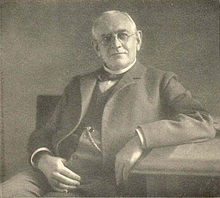Friedrich Paulsen

Friedrich Paulsen (German: educator.
Biography
He was born at
moral philosophy at Berlin.[1]
He was the greatest of the pupils of
reasoning as to means. This conception of will, though consistent and convenient to the main thesis, must be rigidly distinguished from the ordinary significance of will, i.e. rational desire.[2][1]
Paulsen was a proponent of hylozoism, stating it is “a conception which almost irresistibly forces itself upon modern biology".[3]
Paulsen is almost better known for his educational writings than as a pure philosopher, including his German Education, Past and Present (Eng. trans., by I. Lorenz, 1907).[1]
Works
Among his other works are:
- Versuch einer Entwickelunggeschichte der Kantischen Erkenntnistheorie (Leipzig, 1875)
- Im. Kant (1898, 1899)
- "Gründung, Organisation und Lebensordnungen der deutschen Universitäten im Mittelalter". Sybels Histor. Zeitschrift. xlv. 1881.
- Geschichte des gelehrten Unterrichts auf den deutschen Schulen und Universitäten (1885, 1896)
- System der Ethik (1889, 1899; Eng. trans. [partial] 1899)
- Das Realgymnasium u. d. humanist. Bildung (1889)
- Kant d. Philos. d. Protestantismus (1899)
- Schopenhauer, Hamlet u. Mephistopheles (1900)
- Philosophia militans (1900, 1901)
- Parteipolitik u. Moral (1900)[1]
See also
- German new humanism
Notes
- ^ a b c d Chisholm 1911.
- will, he did influence namely his student and later friend, the German founder of sociology, Ferdinand Tönnies.
- David Skrbina(2017). Panpsychism in the West. MIT Press. p. 13.
References
- This article incorporates text from a publication now in the public domain: Chisholm, Hugh, ed. (1911). "Paulsen, Friedrich". Encyclopædia Britannica. Vol. 20 (11th ed.). Cambridge University Press. p. 963.
External links
 Works by or about Friedrich Paulsen at Wikisource
Works by or about Friedrich Paulsen at Wikisource- fps-niebuell.de Archived 2011-07-19 at the Wayback Machine
